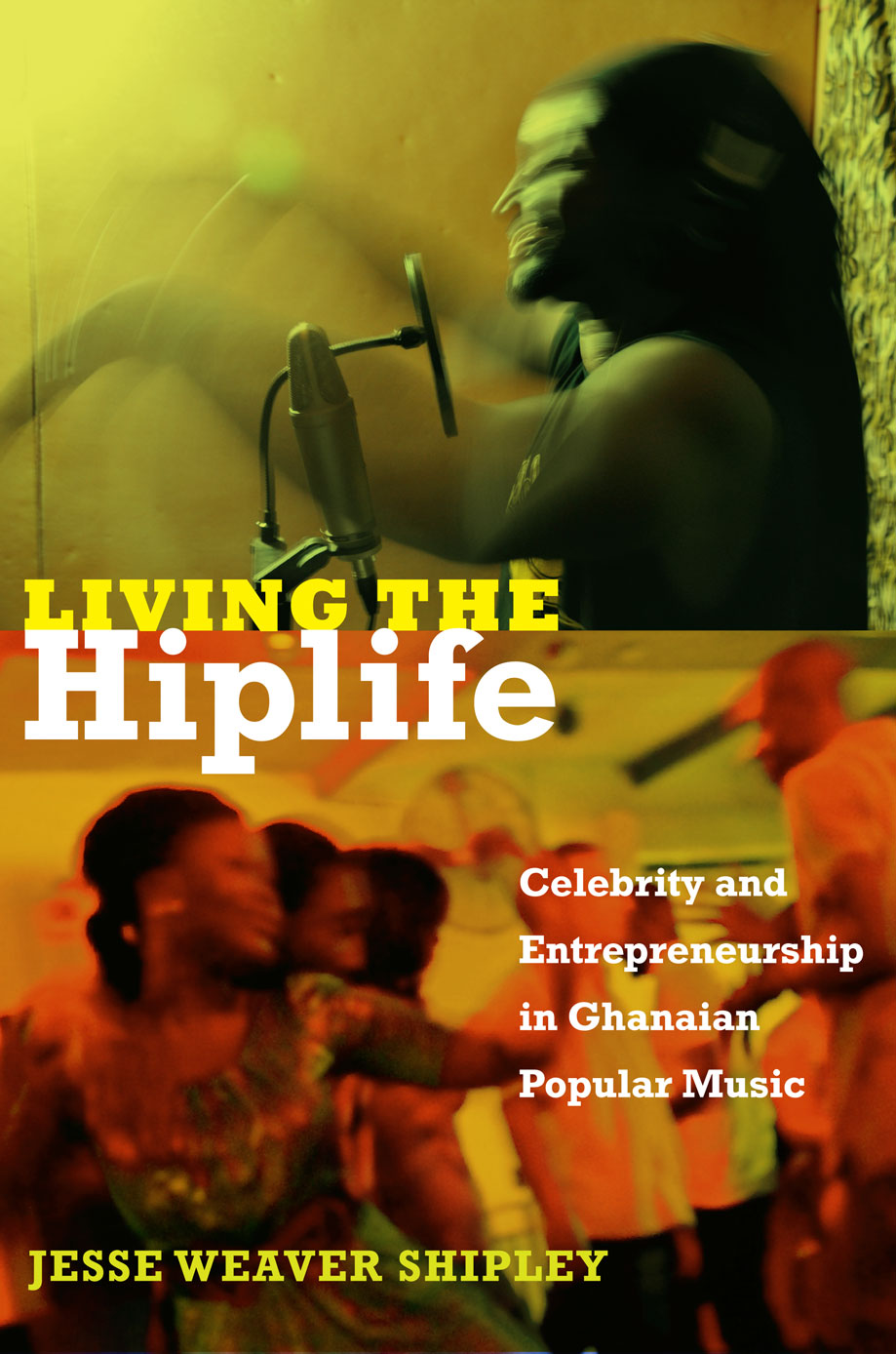Duke University Press announces the publication of a new book Living the Hiplife: Celebrity and Entrepreneurship in Ghanaian Popular Music. Hiplife is a popular music genre in Ghana that mixes hip-hop beatmaking and rap with highlife music, proverbial speech, and Akan storytelling. In the 1990s, young Ghanaian musicians were drawn to hip-hop’s dual ethos of black masculine empowerment and capitalist success. They made their underground sound mainstream by infusing carefree bravado with traditional, respectful oratory and familiar Ghanaian rhythms. Living the Hiplife is an ethnographic account of hiplife in Ghana and its diaspora, based on extensive research among artists and audiences in Accra, Ghana’s capital city; New York; and London. Jesse Weaver Shipley examines the production, consumption, and circulation of hiplife music, culture, and fashion in relation to broader cultural and political shifts in neoliberalizing Ghana.
Shipley shows how young hiplife musicians produce and transform different kinds of value—aesthetic, moral, linguistic, economic—using music to gain social status and wealth, and to become respectable public figures. In this entrepreneurial age, youth use celebrity as a form of currency, aligning music-making with self-making and aesthetic pleasure with business success. Registering both the globalization of electronic, digital media and the changing nature of African diasporic relations to Africa, hiplife links collective Pan-Africanist visions with individualist aspiration, highlighting the potential and limits of social mobility for African youth.
“Living the Hiplife is about young hiplife musicians in Ghana trying to make good while making do. The musicians are at once artists, entrepreneurs, and hustlers. Jesse Weaver Shipley’s ethnography of these artists and their listeners presents their ways of laboring as forms of struggle under neoliberal conditions. I am particularly struck by his identification of the skills of electronic mediation as crucial to good musicianship, good cultural brokerage, good hustling, and good entrepreneurship.”
(Louise Meintjes, author of Sound of Africa! Making Music Zulu in a South African Studio)
“African music, in its newest and most innovative forms, is changing our cultural and political worldview, and Jesse Weaver Shipley is in the know! The all-too-important voices that comprise the tidal wave of creativity throughout Africa, and especially in Ghana, will be the most significant voices of the future. Therefore this book is more than a look at the recent past and the present; it is a blueprint. Living the Hiplife is a necessary analysis of African word, sound, and power.”
(M-1, of Dead Prez)
“Jesse Weaver Shipley has written a highly compelling account of hiplife in Ghana. Historically and ethnographically rich, it demonstrates how this musical form has affected ideas of Ghanaian identity. Not only does hiplife celebrate entrepreneurship among African youth situated in the ‘shadows’ of the global order. It also provides them with a language of mobile signs ‘geared toward capitalist accumulation and consumption.’ Based on a broad range of theoretical sources, Shipley’s writing is lively, his insights memorable. This is a book that anyone interested in Africa, anyone interested in contemporary cultural production, will want to read.”
(John Comaroff, Harvard University and the American Bar Foundation)
“[Shipley] has written with passionate involvement and balances his study with firsthand interviews. The globalization of hip-hop should be no surprise, and this exploration of its reach and how it can be remade provides a fascinating example of the localization and renewal of the form.”
(Bill Baars, Library Journal)
“Shipley offers up a heady mix of political, business, and music history, of entrepreneurship and converging genres, intermixed with reportage and personal contacts as he explores the junction of celebrity, commerce, and politics in contemporary Ghana. . . . [S]cholars of contemporary African culture and aficionados of hiplife will find enlightenment.”
(Publishers Weekly)
“The scholarly passages are hung around lengthy, eminently readable sections that will appeal to anyone who might enjoy modern African music styles, and not necessarily those with a hip-hop bias. Even if you have no particular interest or liking for hiplife, this is an absorbing and very informative book.”
(Martin Sinnock, Songlines)
“[A] fascinating foray into a complex world of musical production, the deployment of shifting technologies, and articulation of conceptions of entrepreneurial success that deserves wide attention and careful consideration…. Living the Hiplife offers readers an admirable mix of ethnographic detail and analytical discussion.”
(Nate Plageman, Journal of Anthropological Research)
“[T]his study not only originally and brilliantly recognizes the role of the diaspora in this cultural field, but it brightly manages to let the audience speak back to cultural producers. Indeed, Shipley repeatedly succeeds in giving voice to these participants, from a local public transport conversation to online forums…. [H]is book significantly contributes to a much neglected field that is the economy of popular music in urban Africa; and I can only welcome and salute such a study, full of original insights, as a firsthand account from an obviously enthusiastic and dedicated participant.”
(Jenny F. Mbaye, Africa)

